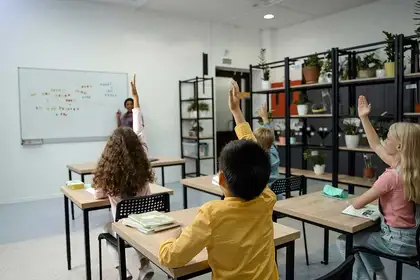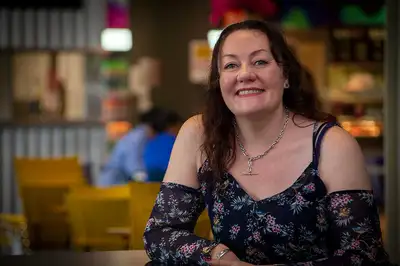
There will be children and teens who will be feeling excited about seeing their friends again and getting back to some normality.
Today marks the return for school for our young people. I am sure there are caregivers across Aotearoa New Zealand who are gleefully looking forward to waving their tamariki and rangatahi off in the morning, and having the house to themselves again - or returning to work themselves and having some contact with people who are not family members!
There will be children and teens who will be feeling excited about seeing their friends again and getting back to some normality with sports, activities and even schoolwork. However, there will also be some young people really nervous about returning to school, just as there will be parents and whānau who will have some worries about how their children will cope going back to school (and about their health and safety) and who will miss the time they have had as a whānau. The full range of emotions is totally normal and important to acknowledge right now.
Lockdown for some young people meant a respite from anxiety, busyness and pressures, especially for our rangatahi at high school. Stress around friendships and social situations, schoolwork, assessments and preparation for exams, decisions around courses and career plans may have been able to be partly shelved for a few weeks. And so may return with full force over the next few days and weeks.
For other young people, lockdown has meant missing out on free school lunches, routines, warm classrooms, and not having access to learning resources, so therefore missing out on learning. As I saw in a meme recently, we have all been in the same storm, but we have not all been in the same boat. So young people will be returning to school with a variety of experiences during lockdown and different starting points for learning and engaging with teachers and peers. Returning to school always means a transition period for everyone concerned – parents and caregivers, youth and educators. And that means riding the wave of emotions for all concerned.
When you are at home with someone for 24 hours a day, seven days a week, you are exposed to their every thought, feeling and behaviour. For parents and caregivers, that can mean a chance to connect with their young people in different ways; but it is also mentally and physically tiring to be carrying the responsibility for your loved ones’ wellbeing without a break. For many young people, their family and whānau are the safe people to ‘let it all hang out’ with; that can mean that families get the full brunt of emotions as young people experience them. What I would say is that this is actually a good thing (though can be challenging in the moment!) if you understand that you don’t have to fix these feelings, but rather, can help your young person tolerate their feelings and learn how to regulate and cope with them.

Dr Kirsty Ross, School of Psychology.
The first thing you can do to help them as they manage their emotions about returning to school is to validate and normalise their emotions and create the time and space for them to talk about their feelings. There is no emotional response right now that is ‘wrong’; by allowing space for all emotions to be expressed (appropriately, without harming anyone physically or emotionally), these emotions will reduce, settle and pass, and young people will realise they can cope with them. Once the emotions feel more manageable, problem solving and looking at choices in how to manage a situation can begin. But please parents know that all the emotions you see in your young people at home right now does not mean they are going to fall apart when they get back to school. In fact, it is not unusual for educators to talk about how well young people manage their feelings at school, before they let them out when they get home to their families. This means that young people often do have a way to manage their feelings at school (or in front of others) but also that they know that they can select the time, place and people to let those feelings out so that they can receive support, understanding and advice (if needed).
So, expect and allow for a full range of feelings tomorrow and in the days ahead. Talk about how to make time and space for those feelings as a family. Make time each day to talk about how you have felt, with no expectation of ‘fixing’ those feelings, but just a time to share. Then you can look at whether these are feelings and situations that will improve with time by themselves, or whether there are actions needed and additional support that needs to be put in place.
Remember that when you haven’t done something for a while, it loses its familiarity and our feeling of competence and confidence in that situation may have temporarily reduced. Having not been at school or work for a while may mean feeling anxious walking back into the school grounds or workplace again; it can mean feeling nervous about whether you will remember the morning routine and the order of showers that needs to occur for everyone to get out of the house on time! But that doesn’t mean that you won’t remember the rhythm and routine with time, and that these places, people, and activities won’t become familiar again. Just give yourself and your loved ones time to remember the familiar, and get used to new processes like mask wearing.
And lastly, please remember that your schools and educators put a huge amount of thought, planning and consideration into ensuring that schools and young people are safe, and will be prioritising wellbeing. Many educators are parents themselves, and your young people are precious to them too. They will also be nervous about wanting to get it right; have faith in their decisions, but ask questions to alleviate your concerns if there are things that are not clear. We are all in this together.
Good communication between home and school means that parents can reiterate the messages from school, and provides reassurance for young people that the adults in their world are working together and can be relied on to ensure their health and wellbeing is taken care of. Then they can relax and trust in those processes and decisions, and get on with the big job of being a young person in these challenging times.
Dr Kirsty Ross is a Senior Clinical Psychologist and Senior Lecturer at Massey University’s Manawatū campus.